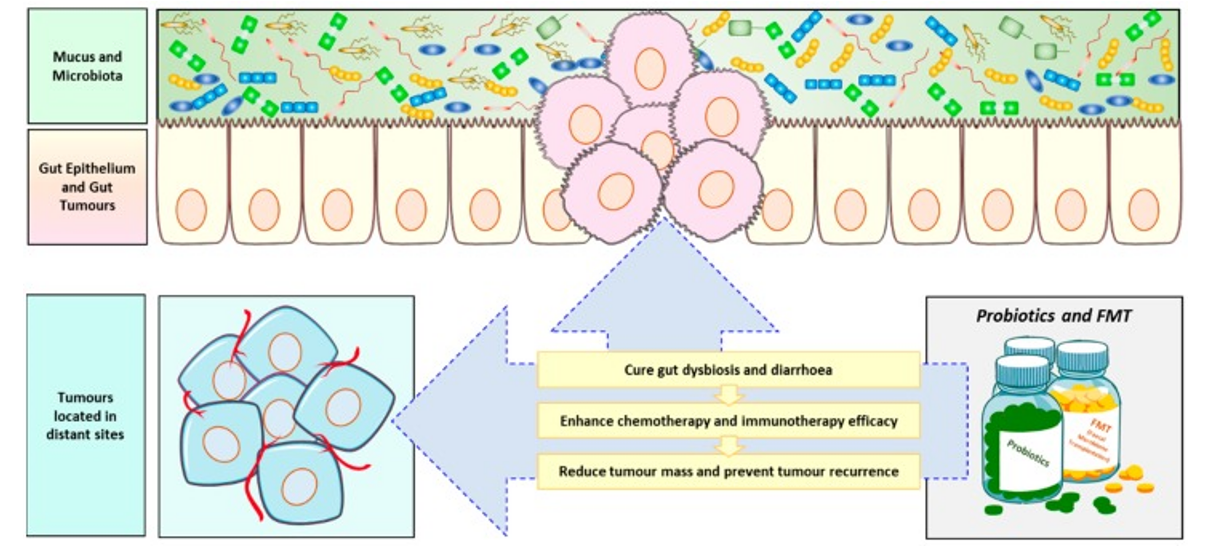The gut microbiota is the main component of human symbiotic microorganisms and has a strong impact on human health. Achieving a balanced relationship between the gut microbiota and the human body, especially its interaction with intestines, skin, oral cavity, and vagina is important for the regulation of the human body's environmental homeostasis. These relationships, among various tissues/organs, microorganisms, and the diversity of microorganisms, are different. The number and diversity of microorganisms in different parts of the same tissue and organ also show distinctions, indicating that the regulation of inflammation, tumor occurrence and development, and their response to anti-tumor therapy is different for each organ. In addition, like a human fingerprint, human symbiotic microorganisms are unique in each person, which can be considered a powerful factor in tumorigenesis. Although some organs of the human body, such as the liver, do not have microorganisms, they are also prone to carcinogenesis. The downstream signaling pathways are activated through the binding of bacteria to specific receptors or various metabolites released by bacteria. Bacterial metabolites can reach specific organs from the intestine through the circulatory system.
The following four mechanisms highlight the occurrence of tumorigenesis as a result of the gut microbiota imbalance:
① Bacterial imbalance: The composition and activity of the gut microbiota are affected by dietary changes, antibiotics, foreign harmful substances, host immune system, and infectious diseases. The destruction of the intestinal microbial community is called dysbacteriosis, which is manifested by a decreased gut microbiota diversity and an increased number of harmful bacteria in the intestine, causing a bacterial imbalance.
② Pathogenic microorganisms. Infections of many bacterial species can lead to tumorigenesis. The microbial community existing in the tumor microenvironment may promote the occurrence of gastrointestinal malignant tumors.
③ Microbial toxins and toxic factors. Certain bacterial species can cause chronic inflammatory diseases, leading to increased production of reactive oxygen species and ultimately regulating genotoxicity. At the same time, they can also regulate tumorigenesis by producing specific bacterial toxins that can cause DNA damage. Various bacterial toxins such as fragile toxin, Escherichia coli toxin colibactin, and cell-lethal swelling toxin (CDT) can affect the cellular responses involved in carcinogenesis, especially those responsible to repair DNA damage.
④ Metabolic abnormal state regulated by flora. Enzymes secreted by gut bacteria play a key role in human metabolism. Gut bacteria contain genes involved in the biosynthesis and catabolism of various compounds. These metabolic processes regulated by the gut microbiota affect tumorigenesis by interfering with the inflammatory diseases caused by obesity, the biosynthesis and detoxification of various compounds (such as nitrogen derivatives, acetaldehyde, and carcinogenic secondary bile acids, etc.).
The imbalance of human gut microbiota plays an important role in tumorigenesis, development, and drug therapy, and is closely related to energy and nutrient metabolism, autoimmune system shaping, drug metabolism and efficacy. Further exploration will help improve the understanding of intestinal microecology and provide more feasible approaches for anti-tumor therapy.
Creative Proteomics has a professional technical service platform focusing on the gut microbiome. We can provide comprehensive multi-omics services and insightful solutions for your gut microbiome research projects.
Reference
Vivarelli, Silvia, et al. "Gut microbiota and cancer: from pathogenesis to therapy." Cancers 11.1 (2019): 38.
